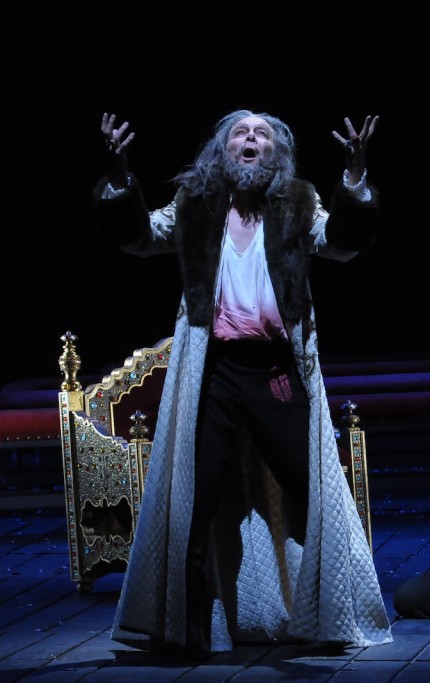Czar power: A riveting Furlanetto leads a superb cast in Lyric’s “Boris”

It’s been sixteen years since the Lyric Opera of Chicago last presented Modest Mussorgsky’s Boris Godunov, a long hiatus for a cornerstone work considered the greatest of all Russian operas.
The Lyric Opera’s current production, which opened Monday night, is far from ideal, but it does succeed in getting the most important element right — namely delivering an inspired lineup of singers in the large cast headed by Ferruccio Furlanetto in a searing, majestic performance as the haunted title czar.
From the time of Chaliapin, the role of the doomed Boris Godunov has been a showcase for the greatest basses of the past century, three of whom — Boris Christoff, Nicolai Ghiaurov and Samuel Ramey — have tackled the role in Chicago.
Fine as those artists were, it was hard not to think Monday night that, in his belated company debut, Furlanetto was providing the most memorable performance of this demanding role that Chicago audiences have ever heard.
The veteran Italian bass has clearly honed the role of the conflicted czar to a fine and nuanced dramatic point. Mussorgsky’s Boris is a humane ruler, haunted by guilt over a single murderous act of ambition, which leads to his downfall — a fitting symbol of a great yet tragic country that cannot ever seem to escape from its own revered and hated past.
From his entrance as a reluctant ascendant to the throne, Furlanetto brought commanding presence and complete authority, vocally and dramatically.
At 62, his voice remains in remarkably strong and flexible estate. In the long narration of Part Two (“I have achieved supreme power”) Furlanetto brought great dramatic force and startling intensity to his long soliloquy. So too he charted Boris’s mental decline with almost clinical detail. One can go a long time without experiencing the kind of complete vocal acting Furlanetto brought to Boris’s death scene — conveying the czar’s filial love, guilt, regret, and defiance — in a performance that was beautifully sung, compelling, and heart-breaking.
The rest of the Lyric cast was on a comparably high level.
Andrea Silvestrelli was an ideal Pimen, his booming sonorous bass with a bit of frayed edge well suited to the aged priest. Silvestrelli’s long narration in Part One was a model of pacing and musical storytelling, the singer ratcheting up the dramatic intensity with his account of the czarevitch’s death.
Stefan Margita, in another notable house debut, embodied the oily Machiavellian Shuisky with his liquid, penetrating tenor and insinuating body movements, a kind of Mime of the Steppes. One could see this cunning and unscrupulous minister doing very well in today’s political landscape.
The Lyric has opted for Mussorgsky’s tauter original 1869 version of the opera — i.e., no Polish scene nor soprano role of Marina to provide a respite from the dominance of dark male voices. That also means a much smaller role for Grigori, yet Erik Nelson Werner made an impressive company debut as the Pretender, singing with dramatic point and firmly focused tone.
As the reprobate priests, Varlaam and Missail, Raymond Aceto and David Cangelosi added a welcome touch of humor to the predominantly dour proceedings, with Aceto bringing gusto to the dissolute Varlaam’s tavern song.
Edward Mout projected the right febrile, whiny voice as the Simpleton. As Boris’s children, soprano Emily Birsan was a graceful Xenia while mezzo Emily Fons added to her growing collection of trouser roles with a boyish, surprisingly credible (for once) portrayal of Boris’s young son, Fyodor.
It’s too bad the Lyric didn’t serve its fine cast better with a fresher, more imaginative staging than the tired production the company used for its last Boris 16 years ago. The antediluvian San Francisco Opera set is barren even by the Lyric’s current brand of bottom-line minimalism, the production at times suggesting Boris–The Oratorio. Scant visual relief is provided by the coptic icons of Act 1 and costume designer Kari Gravklev’s gold-garbed royals and red-robed boyers.
Julia Pevzner’s direction was competent if rarely inspired with low energy in Act 1 and the overdone elephantine symbolism of the omnipresent Simpleton (aka Holy Fool) hugging his little St. Basil’s replica as we pine for the lost innocence of Mother Russia. You just knew the Simpleton was going to make another appearance at the opera’s close, a heavy-handed and unnecessary distraction from Furlanetto’s riveting final scene.
Sir Andrew Davis, making his belated first appearance this season, conducted with momentum and an idiomatic sense of the score’s gaunt, dark-hued lyricism. The Lyric Opera Chorus sang well under Michael Black though sounded underpowered in the Coronation Scene.
Boris Godunov runs through Nov. 29. lyricopera.org; 312-332-2244.
Posted in Performances

